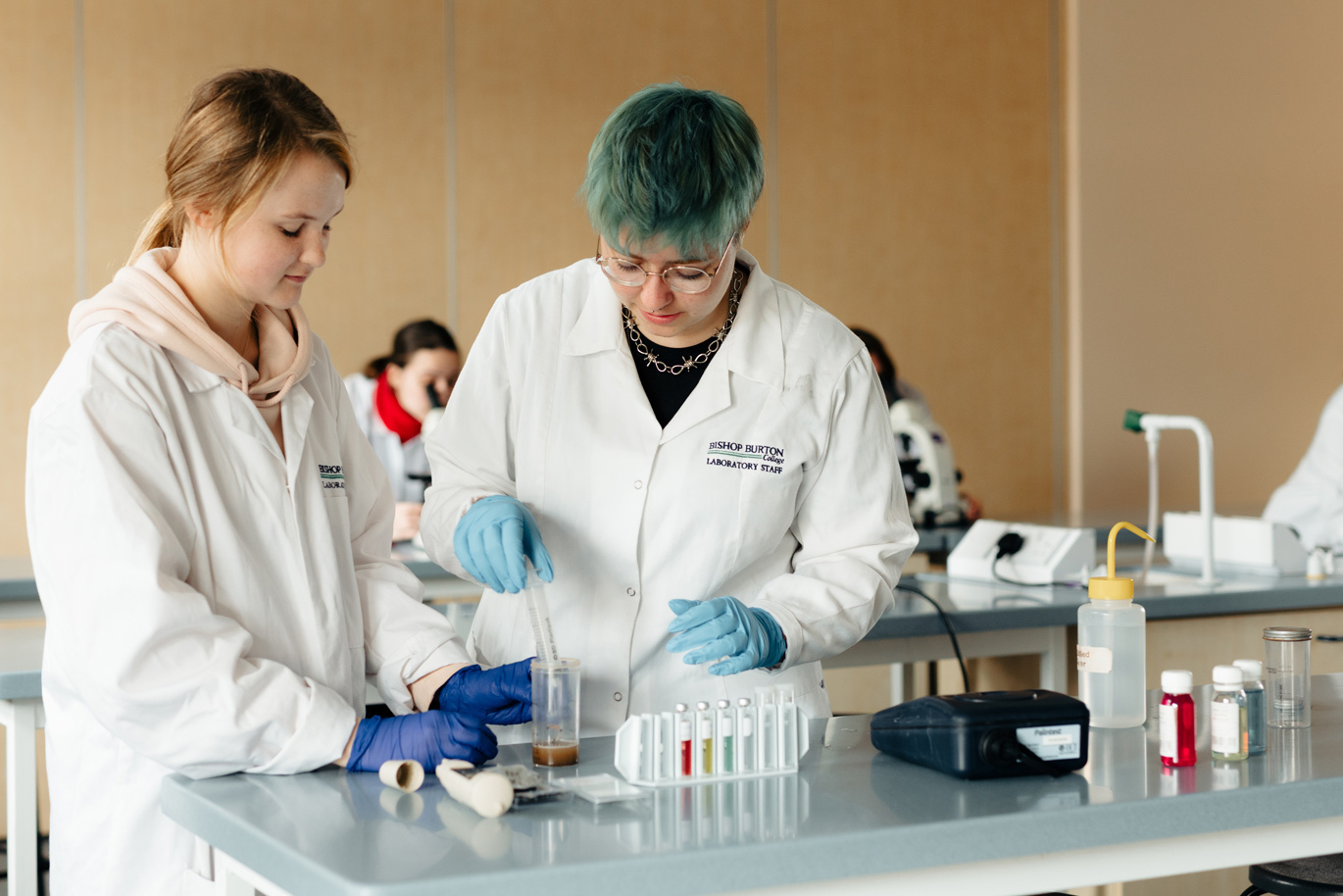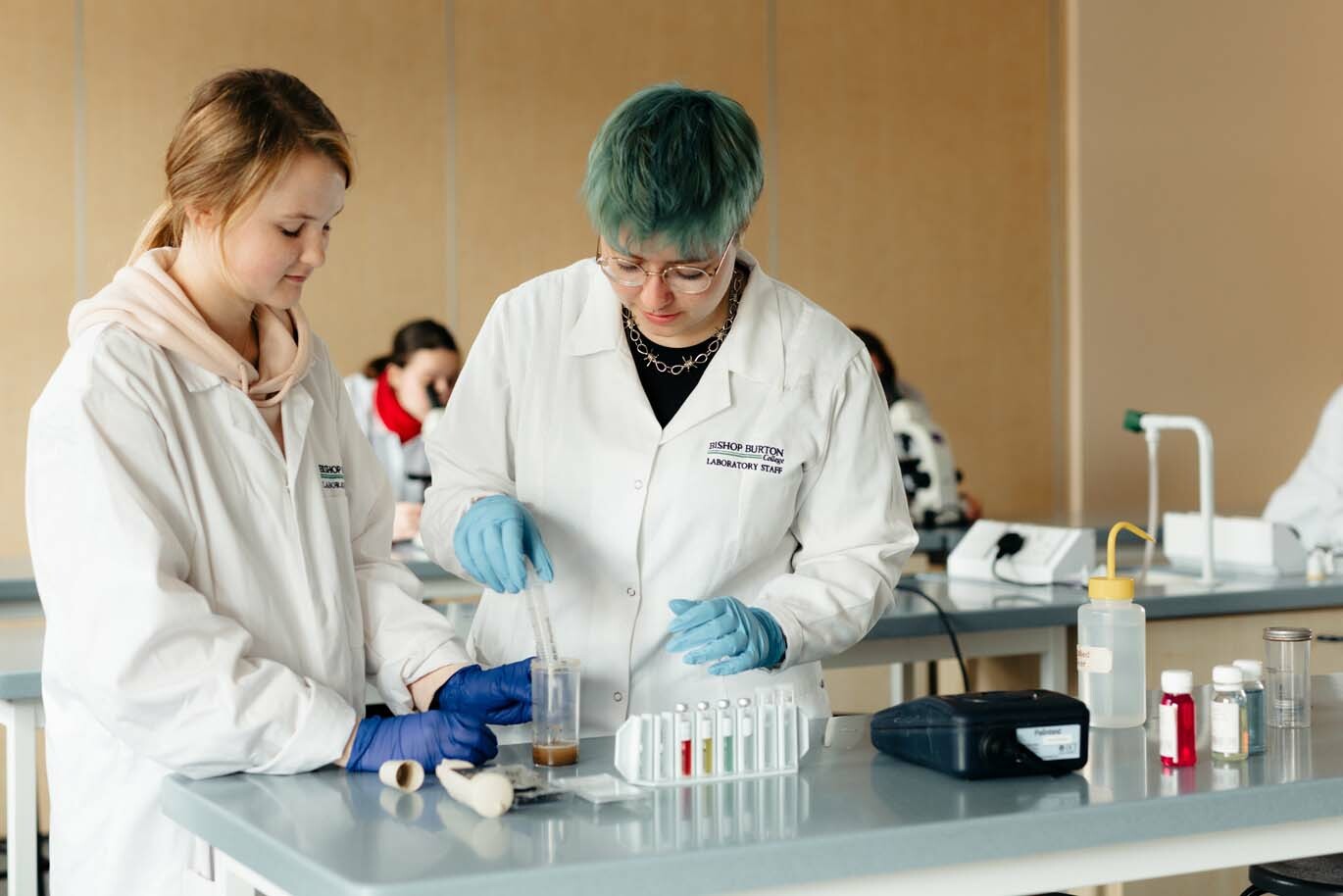The College campus will be closed on Tuesday 22 April due to an unforeseen power outage. Students have been sent communications regarding their requirements for the day. Students can return as normal on Wednesday 23 April to the campus. Thank you for your understanding.

FdSc Applied Animal Health and Welfare
Apply Full-Time Apply Part-Time Enquire about this course Download PDFJump to
Subject
Animal Sciences
Level
Foundation Degree (Level 5)
Study Mode
Full-Time
Duration
2 years full-time/3 years part-time
Start Date
September 2025
The course
Do you dream of working with animals, ensuring their health and welfare while opening doors to an exciting career? This programme equips you with comprehensive expertise but also awards you the industry-recognised HTQ Vet Technician (Livestock) qualification, setting you apart in this competitive field. The programme allows you to explore the fascinating world of companion animals, livestock, and wildlife.
From our state-of-the-art laboratories to farm facilities and animal units, you will apply your knowledge in real-world settings to build confidence and competence. Work experience gives you invaluable industry exposure and the opportunity to develop practical, job-ready skills in professional environments.
Course Information
- The Applied Animal Health and Welfare programme is designed to prepare you for working within the animal sciences industry, helping to improve and monitor the welfare and health of animals in a variety of roles across the industry.
- The programme will allow you to learn in-depth biology and physiology of the animal, and will include the science behind animal health, disease and welfare. It focuses on ensuring you have the necessary laboratory skills to work in a range of areas by completing a variety of lab-based modules in your first and second year. It will also allow you to perform basic diagnostic techniques.
- It is important that you are able to handle and have a good overall knowledge of a variety of animals. You will therefore also be completing modules in practical handling skills across a range of species such as mammals, birds, reptiles, amphibians and invertebrates.
- Upon successful completion of this foundation degree, you could progress to top up your studies on the final year of the BSc Bioveterinary Science or BSc Animal Behaviour and Welfare.
Year 1
- Academic Professional Skills
- Comparative Anatomy and Physiology
- Applied Animal Health and Nutrition
- Applied Animal Behaviour
- Animal Handling and Welfare
- Professional Skills in the Industry
Year 2
- Livestock Health Management
- Data Skills for Animal Scientists
- Ethics, Welfare and Legislation
- Wildlife Health and Rehabilitation Methods
- Leadership Skills in Industry
- Advances in Veterinary Diagnostic Technologies and Laboratory Science
You will need:
A minimum of 72 UCAS points OR a relevant BTEC Level 3 and significant industrial experience
Plus:
GCSE English 4 or above or equivalent and a suitable reference
UCAS points may be from qualifications such as T Levels, A Levels, BTEC Level 3 Extended Diplomas, Access to Higher Education Diplomas, and City and Guilds Advanced Technical Diplomas amongst others. Please use the UCAS Tariff points calculator to determine the UCAS points value of your qualifications.
Life and/or experience of non-traditional students will be taken into account when considering applications. The successful completion of an entry task may be required when considering applications without the required formal entry qualifications.
If an applicants first language is not English, or a Tier 4 student visa to study is required and GCSE English at grade 4/C or equivalent is not held, they will need to evidence their English language proficiency level, such as International English Language Testing System (IELTS) 6.0 overall (with a minimum 5.5 in each skill).
Advanced entry may be possible due to prior experience or certificated learning; applicants will be invited to complete the recognition of prior learning approval process.
This programme is delivered with a variety of learning and teaching approaches to include all students learning styles and preferences.
For all modules, theory lectures are delivered that aim to deliver the core content and provide the underpinning knowledge. To complement the theory lectures, you will have group seminars/practical sessions that are used to reinforce concepts delivered theoretically.
The teaching methods focus on facilitating a student-centred approach to enhance your independent learning that takes place outside of the classroom.
The full-time route incorporates approximately 12-16 hours of contact time per week, encompassing lectures, seminars, practicals and tutorials.
You are also expected to carry out a significant amount of independent study in addition to contact time (approximately 25-30 hours a week). Independent study includes reading around the subject, preparing for tutorials and seminars, preparing for, and completing, module assessments; forming an essential part of your learning journey.
The part-time route incorporates 9-12 hours of contact time per week, encompassing lectures, seminars, practicals and tutorials.
You are also expected to carry out a significant amount of independent study in addition to contact time (approximately 12-15 hours a week). Independent study includes reading around the subject, preparing for tutorials and seminars, preparing for, and completing, module assessments; forming an essential part of your learning journey.
You can expect to receive your timetable during induction week.
- A tablet, laptop or stationery to take notes in lectures and seminars
- College-branded white laboratory coat
- College-branded blue kennel coat
- All college-branded equipment will need to be purchased from our online shop.
- Appropriate waterproof outdoor clothing and footwear for outdoor practicals
- Strong steel toe capped boots for practical sessions
- The college has a strict policy of not allowing work boots inside college buildings you will need to have alternative footwear (shoes or trainers) to attend lectures and tutorials.
- Roughly £300 to cover the costs of field trips and visits over the duration of your programme
- On successful completion of the programme, you will have the opportunity to graduate at a ceremony wearing formal dress. The hire of the formal dress is an additional cost.
Validated by University of Hull
We are proud to collaborate with University of Hull on the validation of this course.
This includes transforming our programmes to ensure that we meet the evolving needs of the sector, giving you the best opportunities for success when you graduate by having a competence-based focus. Find out more about competence-based higher education.
View the policies and procedures you would be agreeing to comply with by registering for this programme. This encompasses University of Hull Quality and Standards, including a Guide for Collaborative Provision students.
Financial Information
Find the full details of the fees associated with this programme and the financial support available.



